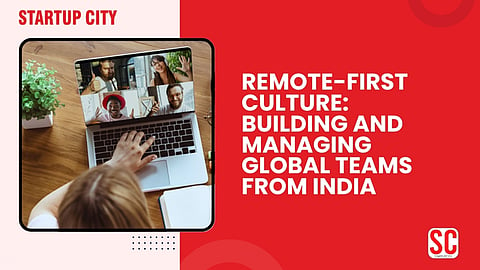

Global Teams from India
Imagine this: your engineering team is based in Bengaluru, your marketing lead works from Bali, and your product manager dials in from Berlin. No office. No commute. Just pure, borderless productivity.
Sounds like a dream? It's not. It's today's reality — and it's changing the way Indian startups scale globally.
In my experience, adopting a remote-first culture has been one of the smartest decisions we made. It’s not just about saving money on real estate. It’s about unlocking global talent, building diverse teams, and accelerating innovation without the limitations of geography.
If you're a founder, CEO, or a decision-maker in India dreaming of going global — this is your moment.
India has always been a global talent powerhouse. But here's the twist — in a remote-first world, we're not just service providers anymore. We're the builders. The originators. The decision-makers.
Cost-Effectiveness: Hiring global talent while leveraging India's lower operational costs offers a strategic edge.
Time Zone Advantage: Overlap with both APAC and European working hours makes India a natural remote hub.
Tech Infrastructure: Fast-growing SaaS tools, cloud infra, and 5G adoption fuel seamless remote collaboration
Talent Readiness: With English proficiency and strong STEM backgrounds, Indian teams adapt fast to global standards.
“Remote work is not a challenge of technology; it's a challenge of leadership.”
— Brian Elliott, Future Forum at Slack
Let me show you how we did it — and how you can too.
Culture is no longer created by watercooler conversations. In a remote-first setup, culture is deliberate. You need to codify:
Your company’s mission and values
Expected communication etiquette
Work-life boundaries
Feedback loops and recognition systems
When you’re not sitting across from someone, trust becomes your superpower. We started looking for people who:
Communicate clearly and proactively
Thrive with minimal supervision
Have a strong bias for ownership
Ask this during interviews: “Tell me about a time you managed a project independently, from start to finish.”
Without casual in-office chats, clarity is everything.
Here’s what worked for us:
Daily stand-ups via Slack or Zoom
Asynchronous updates using tools like Loom, Notion, or Basecamp
Weekly all-hands to build connection and transparency
Top Tools That Make Remote-First Teams Click
I get asked this a lot — “What stack should we use to manage global remote teams?”
Here’s our battle-tested toolkit:
Important: Tools are just the enablers. The real magic lies in how consistently you use them.
When we wanted to hire our first designer from Eastern Europe, we didn’t know where to start. But we figured it out — and you can too.
Use Global Platforms: AngelList, RemoteOK, WeWorkRemotely, and Toptal have been goldmines.
Simplify Contracts: Use platforms like Deel or Remote to handle local compliance, contracts, and payments.
Pay Fairly: Global doesn’t mean cheap. Pay competitively to attract serious, full-time contributors.
"Talent is equally distributed. Opportunity is not."
— Leila Janah, Founder of Samasource
How do you know if your remote team is performing? Here’s how we measure what matters — without becoming micromanagers.
Output, not hours — Focus on deliverables, not login times.
Weekly goals and retros — Keeps alignment high and surprises low.
360° Feedback every quarter — It’s not just top-down.
We replaced annual appraisals with continuous, bite-sized feedback. It’s faster, fairer, and far more effective.
You’re not alone if you've struggled with building emotional connection remotely.
Here’s what worked for us:
Monthly virtual hangouts (non-work, fun stuff)
“Donut Chats” on Slack — random coffee catch-ups
Celebrating personal wins — birthdays, weddings, even new pets!
Remember: connection is a feature, not a bug in remote-first companies.
72% of tech startups are now remote-first or hybrid-first (Source: Forbes)
India ranks #2 globally for remote freelancing and contract talent (Source: Upwork)
Employees in remote-first companies report 22% higher productivity (Source: GitLab Remote Work Report)
Are you leveraging this shift? Or are you stuck in old models?
The old rules are dead. Offices, 9-to-5s, and location-based hiring are relics of a bygone era.
The new game? It’s about remote-first leadership. It’s about building trust across continents, scaling with clarity, and leading with purpose.
And India? We’re not just part of this revolution. We’re leading it.
So, are you ready to go global — from your living room?